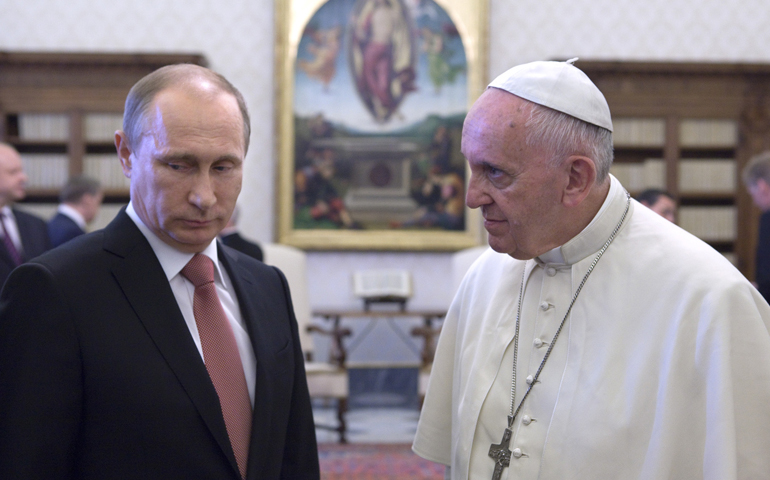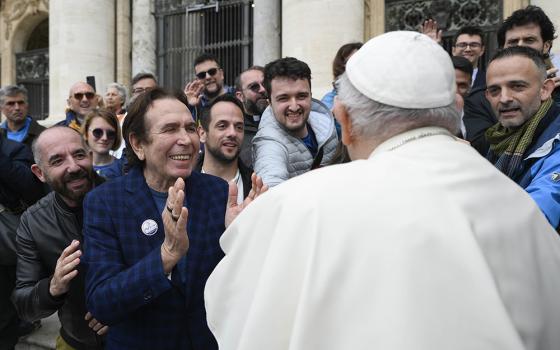
Pope Francis talks to Russian President Vladimir Putin during a private meeting at the Vatican June 10, 2015. (CNS/Maria Grazia Picciarella, pool)
Russia's alleged use of fake news to affect the election raises many questions for our political system. But, it also raises questions about how we in the media operate. Bias is nothing new: from the founding of the Republic, there have been partisan newspapers and the idea of pristine, disinterested newscasts we associate with Walter Cronkite was the exception, not the norm. The bias of FOX News and MSNBC is apparent but the issue of media bias goes deeper and is often more subtle.
Last week, I got a call from a local TV news reporter who wanted me to come in to discuss the decree on seminary formation issued by the Vatican and, specifically, what appeared to be its ban on gay men being accepted as candidates for the priesthood.
I explained to the reporter that I did not think this was a big deal. He said he thought it was a big deal because Pope Francis had signed the document and the ban on gay seminarians seemed to contradict his famous question about a gay priest, "Who am I to judge?" I explained that the document had not been signed by the pope, which would indeed have given it a greater level of authority, and that guidelines issued by a Roman dicastry were the equivalent of a new regulation from the Department of Housing and Urban Development. In some sense, the pope, like the president, is responsible, but it is not earth shattering. In the back of my mind, I entertained the worry: The mainstream media would love nothing better than to pull down Pope Francis from his pedestal.
Apparently, the reporter's interest in the story was piqued by a press release from New Ways Ministry, an advocacy organization that seeks greater recognition and respect for gays and lesbians within the Catholic church. In the media, we often do rely on advocacy groups to call things to our attention, perhaps a little too readily. I do not mean to pick on New Ways Ministry, but they have an agenda.
Advocacy groups necessarily develop expertise that can be helpful to a reporter trying to understand the significance of some development. But, advocacy groups also bring with them a definite myopia. It goes with the assignment. If you focus on one issue all the time, any change or news related to that issue can take on a significance out of proportion to the whole picture. Certainly, we have seen how groups like the Becket Fund frame discussions of religious liberty in ways some scholars find tendentious. Or, the way the extraction industry funds groups like the Acton Institute who seek to minimize the importance of a truly significant development like Pope Francis' encyclical on the environment Laudato Si'. In all three cases, the groups in question know a lot about the subject matter at hand, but they often provide a very one-sided view of that subject matter.
Interest groups are capable of making something that is not that important seem earth-shattering and, conversely, minimizing the downside of the proposals they advocate. That, too, distorts "the news." Interest groups also pose a different problem from one of hermeneutics. They need to raise money and their donors always want to see their money making a difference. There is no easier way to appear to be making a difference than to be cited in the media. So, interest groups have a vested interest, apart from intellectual blinders, for garnering attention to their issue. This sometimes results in a bizarre symbiotic relationship between advocacy groups on opposite sides of the same issue. We saw this when President Obama was first elected and pro-life groups raised the alarm about the "Freedom of Choice Act" which was never, ever going to make it through Congress, and which had begun thirty years earlier as a fundraising device for pro-choice groups. The radicalness of the bill made it a non-starter, but not with donors.
Academics enjoy the independence to say what they think that tenure accords, but they, too, can be myopic in their focus. Generally, there is in most academic settings a pronounced tilt to the left. Nicholas Kristof discussed this in last Sunday's New York Times, writing, "I fear that liberal outrage at Trump's presidency will exacerbate the problem of liberal echo chambers, by creating a more hostile environment for conservatives and evangelicals. Already, the lack of ideological diversity on campuses is a disservice to the students and to liberalism itself, with liberalism collapsing on some campuses into self-parody." Apart from ideology, the academy today tends to require scholars to focus on ever more narrow subjects to get published. When you go to an academic conference, it is not uncommon for one of the speakers to answer a question by referencing some stray bit of information drawn from their scholarly work, even when its relationship to the larger question is somewhat tenuous.
In the case of the guidelines from the Vatican, the people whose thoughts matter are bishops who run seminaries. Their opinions are consequential. And, some bishops would rather get a root canal than talk to the media. As well, the Vatican is not adept at media strategy: They could have foreseen the questions being raised by this document and sent a heads-up to one or two bishops, asking them to be available to the media when the document was released. When pigs fly.
Most reporters do their best and their best is usually pretty good. But, readers would be able to approach our stories with less skepticism if all of us in the business of journalism brought more skepticism to our task, especially skepticism about our own biases.
[Michael Sean Winters is NCR Washington columnist and a visiting fellow at Catholic University's Institute for Policy Research and Catholic Studies.]




